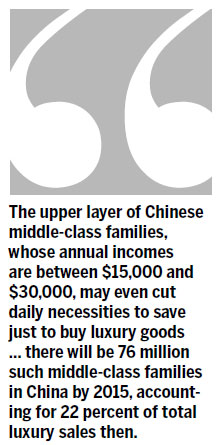
China's luxury goods market may be booming, but global brands should still exercise prudence in trying to grab a share of the market
Luxury brands are targeting consumers in the emerging markets, because these new engines of the global economy have strong and growing purchasing power even against the backdrop of global recession. This is especially true of China.
According to the latest data from the Ministry of Commerce, the goal for the next five years is a 15-percent annual growth for retail sales of consumer goods to reach a total of 3.2 trillion yuan ($507 billion) by the end of 2015. And many top brands are scrambling to grab a share of this lucrative market. But is such confidence justified?
The latest report from Bain Capital, published on Dec 22, estimates that the consumption of luxury goods in China reached 100 billion yuan in 2011, with an annual growth rate of 25 to 30 percent. The report also predicts that China is likely to surpass Japan as the largest consumer of luxury goods this year.
Financial results support such expectations, because luxury brands, especially the top-end ones, have indeed benefited from soaring sales in China. Hugo Boss, the luxury menswear group, which claims to be in "more or less all" Chinese cities with a population of more than 5 million, saw its sales in the country grow 73 percent in the first nine months of 2011. Such growth is echoed by many other luxury brands, which have been busy raising their profits in China.
HSBC estimates that sales of global luxury brands in China have risen more than 30 percent a year over the past four years, far outpacing income growth, and suggests it could keep growing.
Even though the Chinese market comprises just 3 percent of its global sales, American brand Coach, a listed company in New York, made its cross-listing in Hong Kong in December 2011, which, as Coach Chief Executive Lew Frankfort remarked, was less for financial reasons than as a form of marketing that would "raise awareness of the brand among investors and consumers in the Chinese market as well as throughout Asia".
According to Yuval Atsmon, a partner at the global management consulting firm McKinsey, luxury brands have their sights firmly set on the potential purchasing power of the growing number of Chinese middle-class families, particularly those in second- and third-tier cities.
The upper layer of Chinese middle-class families, whose annual incomes are between $15,000 and $30,000, may even cut daily necessities to save just to buy luxury goods. According to the latest McKinsey survey "Insights China: Luxury Goods", published in March 2011, there will be 76 million such middle-class families in China by 2015, accounting for 22 percent of total luxury sales then.
The huge purchasing power is also to a large extent driven by China's present-giving culture. According to Bain Capital, nearly half of all the luxury goods purchased in China are bought as gifts, including those used for business purposes. "In China the importance of giving gifts is a major influence," Atsmon said.
While rising incomes and the gift culture are two factors behind the growth of the luxury goods market in China, some experts doubt whether the growth could be sustained.
Some economists predict that China's economy will slow down this year. Goldman Sachs even warned recently that the golden years of BRICS (Brazil, Russia, India, China and South Africa) have come to an end, for they have already fully exploited their economic growth potential. This would result in a similar situation that occurred in Japan when consumers moved away from luxury goods as the economy stagnated.
Also, the demand for luxury goods as business gifts is likely to decline as the business environment becomes more transparent, and gifts will be no longer seen as a way of oiling the wheels of business deals.
Luxury brands should also pay attention to the negative impacts of giving gifts since corruption may come to include the acceptance of luxury business presents and could cause severe damage to their image in China, forcing them to lose potential customers.
Bain Capital's latest report says 60 percent of the increase in the Chinese luxury market is from new customers. Clearly, the Chinese market is a tremendous opportunity for many brands, but they should proceed with caution rather than reckless abandon.
The author is a reporter with China Daily.
(China Daily 01/07/2012 page5)